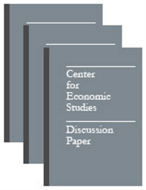The Matching Multiplier and the Amplification of Recessions
The Matching Multiplier and the Amplification of Recessions
Working Paper Number: CES-22-20
Abstract
This paper shows that the unequal incidence of recessions in the labor market amplifies aggregate shocks. Using administrative data from the United States, I document a positive covariance between worker marginal propensities to consume (MPCs) and their elasticities of earnings to GDP, which is a key moment for a new class of heterogeneous-agent models. I define the Matching Multiplier as the increase in the multiplier stemming from this matching of high MPC workers to more cyclical jobs. I show that this covariance is large enough to increase the aggregate MPC by 20 percent over an equal exposure benchmark.
Others in Series
Working Paper
Age, Sex, and Racial/Ethnic Disparities and Temporal-Spatial Variation in Excess All-Cause Mortality During the COVID-19 Pandemic: Evidence from Linked Administrative and Census Bureau Data
We detail excess all-cause mortality in the first year of the pandemic and its implications for entrenched racial/ethnic mortality disparities in the U.S.
Working Paper
Structural Change Within Versus Across Firms: Evidence from the United
We document the role of intangible capital in manufacturing firms' substantial contribution to non-manufacturing employment growth from 1977-2019.
Working Paper
Agglomeration Spillovers and Persistence: New Evidence from Large Plan
Highly incentivized new plant openings do not generally generate productivity spillovers but are associated with positive increases in manufacturing shares.
Page Last Revised - June 28, 2022




